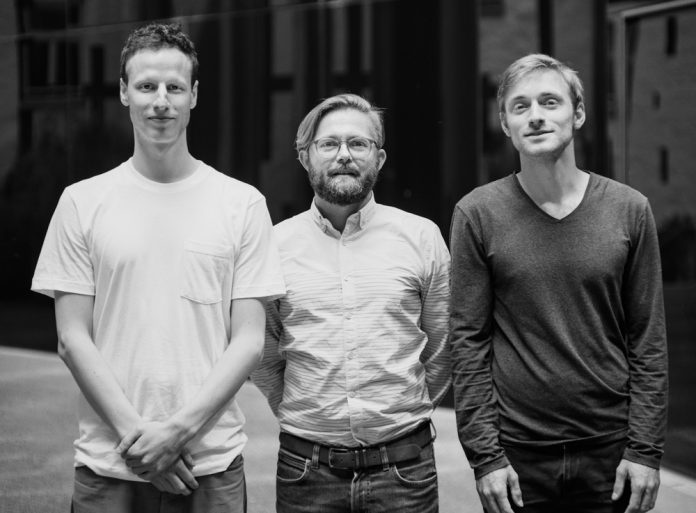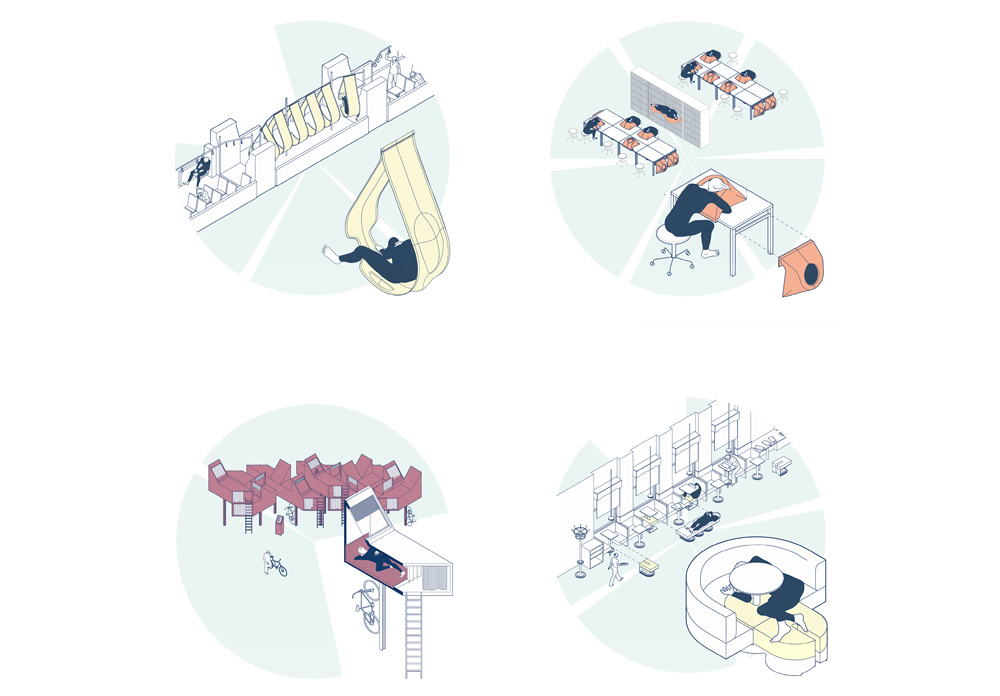
Bedroom Exodus – Concepts for a sleep culture revolution in public space
Bedroom Exodus is the name of the manifesto of the young team of architects, Jerome Becker, Florian Sammer and Lukas Vejnik, who are calling for a “sleep culture revolution.” Their studies, which take the form of an architecture project, question the social historical developments and cultural differences when it comes to embedding sleep in our everyday lives.
Sleeping through the night in the intimate space of one’s private bedroom is a relatively recent European cultural historical development. It was only from the 17th century onwards that it became common practice in the houses of the European nobility to provide separate rooms intended solely for sleeping at night. The architecture and design project “Bedroom Exodus” calls this culturally determined form of sleep into question. Here, questions about the acceptability and value of sleep in our modern, performance-oriented society. Through design drafts intended to encourage the displacement of sleep to semi-public and public spaces, the purpose is also to make the subject itself a focus for debate. The project was initiated by the three Viennese architects Jerome Becker, Florian Sammer and Lukas Vejnik. We spend a third of our lives asleep. Yet it’s only since the first industrial revolution that it has become an established pattern that a fixed sleep phase is used during the night in parallel to the introduction of set working hours. This has remained true until today. On average the sleeping phase lasts seven to eight hours. Sleep is also closely linked to living. The bedroom is always also a place of retreat.
Sleep as a collective experience in a public space
In our cultural environment, sleep is only acceptable in a small number of public contexts, such as taking a nap during a train journey. However, in other cultural circles, it is viewed differently, such as the siesta culture in South America and the Mediterranean region, or the “inemuri” in Japan – several short power naps distributed over the day. In order to develop new concepts of sleep, the Bedroom Exodus team analysed the sleeping habits of different cultural spaces, and tried to transfer these insights to their cultural environment in Vienna. Jerome Becker, Florian Sammer and Lukas Vejnik met at the Technical University in Vienna. The first ideas for the Bedroom Exodus emerged in 2013 during a seminar at the Institute for Architecture and Design. Florian Sammer taught at the Technical University in Vienna, while Jerome Becker and Lukas Vejnik were still studying there. They continued to pursue their ideas for a sleep culture revolution as an independent research project.
 The research trio delivers designs that show how sleep can be integrated into everyday situations in our public life. Some examples are a kind of hammock in public transport or an extension for seats in cafés, which provide space for sleeping in public areas. By taking sleep out of a specific location, a polycentric use of urban space emerges, with the aim of rethinking one’s sleeping behaviour. This means that in a polycentric city, a wide range of different options for a polyphasic sleep rhythm can be offered. According to this concept, night- and daytime become individual and subjective. The project includes the provision of opportunities to sleep at any place and any time. Then, sleep beomes a phenomenon that not only happens in the private bedroom, but can rather be understood as a collective “activity”.
The research trio delivers designs that show how sleep can be integrated into everyday situations in our public life. Some examples are a kind of hammock in public transport or an extension for seats in cafés, which provide space for sleeping in public areas. By taking sleep out of a specific location, a polycentric use of urban space emerges, with the aim of rethinking one’s sleeping behaviour. This means that in a polycentric city, a wide range of different options for a polyphasic sleep rhythm can be offered. According to this concept, night- and daytime become individual and subjective. The project includes the provision of opportunities to sleep at any place and any time. Then, sleep beomes a phenomenon that not only happens in the private bedroom, but can rather be understood as a collective “activity”.
Can a polyphasic sleep culture counteract sleep disorders?
Today’s performance-oriented society often ignores our need for sleep and times when we can rest. The neurobiologist and scientific journalist Peter Spork talks of a “society suffering from a chronic lack of sleep”. Some companies even provide their own sleeping cabins in order to bind their employees even longer to their workplace. The pressure to perform and the fear of losing one’s job facilitate one of the major diseases caused by civilisation of our times: a lack of sleep. The pressure to perform in our capitalist world encourages the notion that we must function during the day and use the night to recover. According to medical experts, there is no reason not to have a midday nap. Conversely, it’s also not detrimental to health only to sleep at night for a fixed period. The only important thing is to have a regular sleeping pattern. Our accustomed sleep pattern is base on economic and commercial interests. Babies have a polyphasic sleep pattern, which they are forced to abandon as they grow older. This rhythm is in turn better adjusted to the level of performance required by our western working and education practices. While the Bedroom Exodus team continues its lively exchange of views with “sleep experts” such as Hannah Ahlheim, who has studied the history of sleep from a scientific perspective, or the figurehead of polyphasic sleep, Marie Staver, as a next step, they are planning to concentrate more on the role of rest in different social and spatial situations.
Jerome Becker, Florian Sammer und Lukas Vejnik
Forschungskollektiv
Bedroom Exodus
www.bedroomexodus.com











